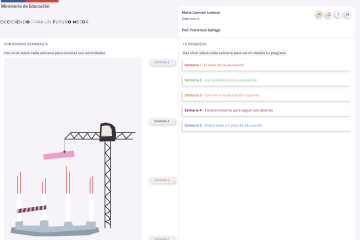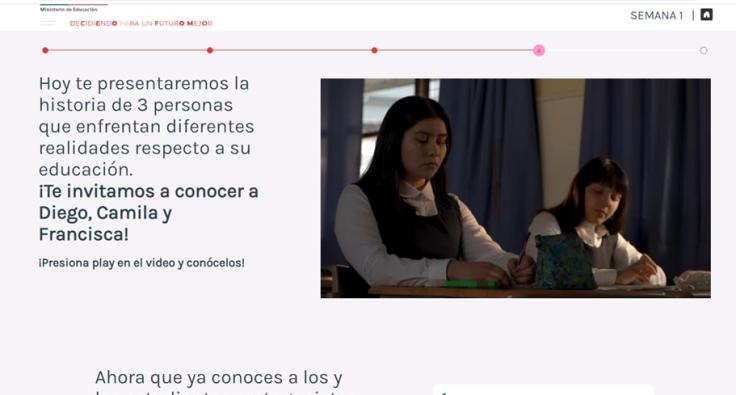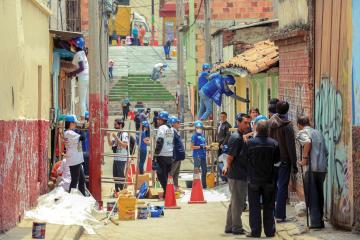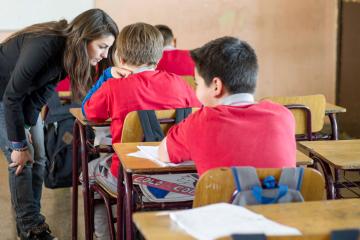
Applying evidence to help students catch up

School closures due to Covid-19 have thrown education in Latin America and the Caribbean (LAC) into crisis: 170 million students in the region missed school, educational outcomes are worsening, and socioeconomic gaps are widening. The World Bank estimated that an additional 7.6 million children in the region will not be able to read proficiently by late primary school, and in some countries, learning losses could be equivalent to almost a year of school. In the future, this could translate to an average yearly loss in earnings as high as US$1,313 per student.
How can we begin to address a crisis of this magnitude, whose aftermath will last for years? To start, we can turn to the ample body of education evidence to guide us in these turbulent times. It is useful to know what has already helped to improve educational outcomes, but it is even more relevant to understand why it worked and how we can apply and scale up it to different contexts. After almost two decades of J-PAL affiliates conducting randomized evaluations of interventions to improve student learning, we have learned numerous lessons that can be applied in the region.
The role of research and evidence
There are several strains of evidence that we can use for students to catch up, both in and outside times of Covid-19. Existing literature suggests that we might improve learning outcomes by providing information about educational performance and options to students and their parents, tailoring instruction to students’ learning levels, encouraging early childhood stimulation, developing non-cognitive skills, and supporting teachers with pedagogical tools.
While not all of the evidence above was generated in LAC, these global lessons can be applied to the regional context. J-PAL affiliates produce and use existing evidence to design programs, and evaluate them to generate further evidence. For example, they found that:
- A three-month small group tutoring program in Chile had persistent effects on specific subjects, with stronger effects on more at-risk students.
- Although promising in some aspects, digital technologies—such as installing refurbished computers in Colombia or offering a math online platform in Brazil—are promising but have unique implementation challenges, ranging from how to integrate them into the educational process and curriculum, to issues related to connectivity and availability of electronic devices.
- Providing information on the benefits of education and the opportunities for pursuing higher studies improved students’ attendance and enrollment in schools of higher quality.
- Conditional cash transfers increased enrollment in Honduras and Mexico, and improved education and learning outcomes in Nicaragua.
- Two programs implemented in Mexico that engaged parents either by giving resources to parent associations or by providing information on how to support their children did not impact educational achievement. However, the information intervention increased trust between teachers and parents, while the other program decreased it. A study in Chile found that sending frequent SMS messages to parents increased math GPAs and attendance.
Driving evidence use on the continent
These insights can be of great help to guide practitioners and policymakers; however, at J-PAL LAC we believe that it is not enough to simply make evidence available. During our more than ten years of existence, we have been nudging and advising them on the design and implementation of policies and social programs.
Another outstanding example is the joint work with the Peruvian Ministry of Education and IPA to establish MineduLAB, an innovation lab for education embedded within the national government. Through several Innovation Windows, MineduLab has run or is currently running more than ten evaluations and three scale-ups.
One of those three scale-ups consisted of providing information to the students on the value of pursuing their education, through compelling “telenovela-style” videos and a tablet app. The intervention, previously implemented in the Dominican Republic, increased the perceptions of the benefits of pursuing higher education and decreased drop-out rates. The videos were broadcasted nationally when schools closed for Covid-19.
After reviewing that and other interventions in Chile, the Dominican Republic, Mexico, Argentina, and other countries, the World Bank defined programs that give information on the benefits, costs, and quality of education as “great buys” because of their high cost-effectiveness.
Research for Covid-19 response
Currently, J-PAL affiliates Christopher Nielson and Francisco Gallego, with the support of J-PAL LAC, are piloting in Chile an online version of the same “telenovela-style” program. The platform relies on compelling storytelling and information about the benefits and financial pathways to continuing one’s education, and allows teachers to give feedback and lead group discussions

In addition to reducing drop-out, it is critical to address the decline in learning outcomes caused by the difficulties of remote learning. One strategy that is gaining popularity is the implementation of remote tutoring programs. J-PAL affiliates Michela Carlana and Eliana La Ferrara implemented a program of this kind in Italy and found positive effects on academic performance, socio-emotional skills, aspirations, and psychological well-being, especially for students in more vulnerable situations. Building on that experience, together with Astrid Pineda and the support of J-PAL LAC, they piloted an online tutoring program with volunteers in the Dominican Republic. They now plan to scale nationally and bring the program to other countries in LAC.
Research plays a crucial role in helping us to choose the most effective strategies to solve pressing social problems. The joint efforts of researchers, partners, funders, and policymakers make rigorous, relevant, and timely research possible, and J-PAL LAC plays a central role in bringing these stakeholders together. As we look to the future, we are optimistic about the role evidence will play in driving recovery in LAC’s educational systems post-Covid-19, and we look forward to working with new partners to learn and apply lessons from evidence generated during the pandemic.



